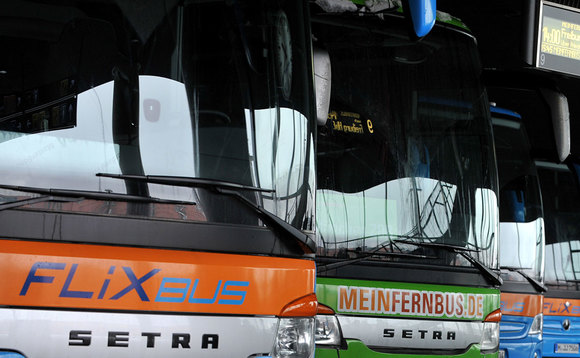
Deal in Focus: General Atlantic hits the road with bus network

General Atlantic’s investment in MeinFernbus and Flixbus heralds a new direction for the long-distance bus market in Germany. Harriet Bailey explores a deal made possible thanks to some clever timing and a detour around the German competition authorities
Last week, General Atlantic took a significant minority stake in two bus companies, Flixbus and MeinFernbus, which will work together to create a pan-European bus service. The investor will support the new business's growth plans. Notably, MeinFernbus Flixbus aims to increase the number of buses in operation from its current 560 to 1,000 by the end of the year.
"So far, both Flixbus and MeinFernbus have focused their operations on Germany and Austria," says Nikolas Zirngibl, a partner at Flixbus's legal adviser Hogan Lovells. "Part of the merger is stabilising the German network and becoming the market leader but expansion across Europe is definitely the next step for them."
The merger of Germany's two biggest bus companies, with an eye on rapid growth and potential market domination, has avoided close inspection by the German cartel authorities by dint of a legal loophole. Businesses are only subject to scrutiny where the newly formed company, its predecessors and its competitors generate revenues above a certain threshold. Relevant turnover figures are taken from the previous business year.
"Everyone would now expect this transaction, combining these two quite big players, to require cartel approval," says Zirngibl. "However, as both companies only started their services in early 2013, the relevant revenue figures did not hit the filing thresholds for merger control clearance." If the companies only started to see significant growth in 2014, it could be argued that it was 'now or never' for the former competitors, who may not have been able to avoid pre-merger controls had they waited until 2015 to sign off on the deal.
Deutsche Bahn domination
General Atlantic, along with Flixbus's venture capital backers Holtzbrinck Ventures and UnternehmerTUM, have been the first to take advantage of the change in German regulations in the long-distance bus market.
The 1934 Passenger Transportation Act prohibited long-distance bus travel in order to protect the state-owned Deutsche Bahn, currently Europe's largest railway operator, and was only repealed in 2013 as part of the CDU/FDP coalition agreement announced in 2010. Both Flixbus and MeinFernbus were set up in 2011, ready to take advantage of the liberalisation two years later.
They were not alone. Fierce price wars ensued between the start-ups who were free to challenge the Deutsche Bahn monopoly. Customers who had waited 70 years for a cheaper, greener alternative are rapidly beginning to switch their allegiance from the notoriously strike-ridden railways.
City2City was the first casualty of the heated competition, closing its doors in October last year due to the pressure of offering customers ever lower prices in a saturated market. The National Express-owned subsidiary and number five operator in Germany registered losses of €2.5m for 2013.
Deutsche Post and ADAC reached fourth place with their ADAC Postbus, but in November 2014 the German automobile club pulled out of the joint venture, leaving the German postal service to steer the business alone. November also saw Deinbus.de, the company which won the decisive legal battle against Deutsche Bahn, file for bankruptcy. However, the troubled bus service seemed to be back on track by late December when it announced it had found a new investor.
Still in operation are Deutsche Bahn's Berlin Linien Bus, a long-distance bus service departing from and terminating in Berlin, and its IC Bus service linking several German cities with neighbouring European countries. Due to exceptions in the original Act, both services had been in operation before the liberalisation.
The price war appears not to have put off new players. Stagecoach subsidiary Megabus may enter the fray, and cites its double-decker buses as its secret weapon for lower prices. "If Stagecoach enters the market it will be interesting to see how it finances its operation. Or if other players find their niche and it becomes a broader market, I can see more opportunity for venture capital and private equity financing," says Zirngibl.
Route to success
Flixbus and MeinFernbus managed to survive the 2013 price war by securing external financing. While MeinFernbus obtained minor investments from business angels, Flixbus received growth capital from strategic investor Daimler Group, the venture capital arm of the Technical University of Munich UnternehmerTUM, and media and technology investor Holtzbrinck Ventures in September 2013.
The Flixbus investment marked a significant departure from the venture capital firm's usual investment focus. According to Holtzbrinck's website, it supports founders "in developing their internet businesses" and counts Zalando, Groupon and Delivery Hero among its former portfolio companies. However, just over a year after the initial financing the diversification in strategy appears to be paying off.
Holtzbrinck is believed to have contacted General Atlantic directly regarding the opportunity to invest in the business, though the current business plan is said not to outline any requirement for further financing from the backer. According to search engine CheckMyBus, long-distance bus services ferried 19.6 million passengers to their destinations last year – Flixbus and MeinFernbus accounted for 10.5 million of the total. This is more than the 8.2 million passengers who travelled by bus in the whole of 2013.
Price wars, the perceived reliability of buses in the face of persistent and extensive rail strikes and the relative environmental advantages of buses over trains and planes suggest other investors have been idling in neutral as far as travel investments are concerned.
Latest News
Stonehage Fleming raises USD 130m for largest fund to date, eyes 2024 programme
Multi-family office has seen strong appetite, with investor base growing since 2016 to more than 90 family offices, Meiping Yap told Unquote
Permira to take Ergomed private for GBP 703m
Sponsor deploys Permira VIII to ride new wave of take-privates; Blackstone commits GBP 200m in financing for UK-based CRO
Partners Group to release IMs for Civica sale in mid-September
Sponsor acquired the public software group in July 2017 via the same-year vintage Partners Group Global Value 2017
Change of mind: Sponsors take to de-listing their own assets
EQT and Cinven seen as bellweather for funds to reassess options for listed assets trading underwater








